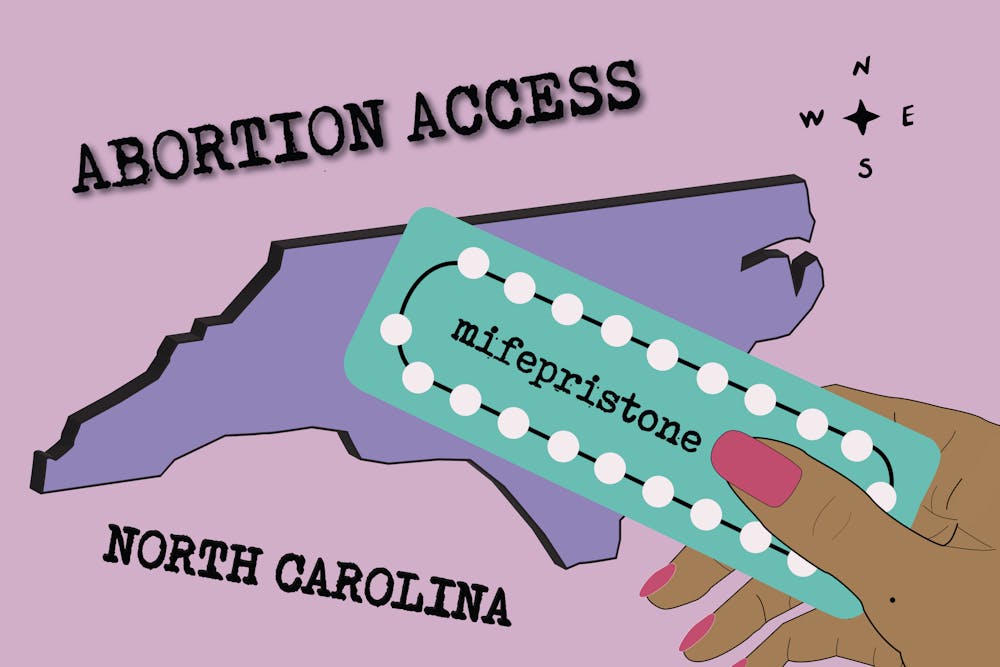Compared to the risk factor of other commonly used medications like penicillin and Tylenol, abortion pills are safer to consume, with serious complications recorded in less than three percent of users.
“Based from a medical perspective, do not worry — these pills are safe, effective,” Elisa Wells, the co-director of Plan C Pills, said. “And in many places in the world, people are buying them themselves and using them to self-manage their abortions.”
Access to abortion pills in North Carolina
On July 1, 2023, North Carolina enacted Senate Bill 20, a ban on abortion after 12 weeks of pregnancy. Previously, state legislation allowed abortions up to 20 weeks of pregnancy.
S.B. 20 also placed restrictions on accessing medication abortions by banning the prescription of abortion pills through telehealth medicine and receiving pills by mail as well as prohibiting certified midwives, physicians and nurse practitioners from providing abortions.
Under the legislation, abortion pills could only be obtained in the state through visits to an in-person clinic and patients were required attend a follow-up appointment post-abortion.
However, on June 3, Catherine Eagles, the chief judge of the U.S. District Courts for the Middle District of North Carolina, issued a ruling striking down some of the state’s restrictions.
Now, patients can legally access abortion pills in the state through online clinics, receive them by mail and are not required to attend follow-up appointments.
Gavin said it is going to take time for clinics to roll out telehealth programs since they were previously forbidden from operating them, but it will ultimately lead to increased accessibility to abortion pills.
Though regulations were loosened, patients are still required to undergo an in-person exam, blood testing, an ultrasound and a 72-hour waiting period after receiving counseling from an abortion provider.
The waiting period is one of North Carolina’s biggest barriers to accessing abortion pills, Gavin said, as it delays the patient's ability to pursue care early on in a pregnancy.
Impact in North Carolina
To get the day's news and headlines in your inbox each morning, sign up for our email newsletters.
Following the passage of S.B. 20, reproductive health care services in the state have had to increasingly spend more on practical support for patients, a staff member at the Carolina Abortion Fund, said.
She said many patients from North Carolina have had to travel to other states with later gestation limits.
“Not only, with the S.B. 20 that passed last summer, did the actual cost of abortions go up in the clinics, but the cost of travel and all the wraparound care has also gone up as well,” she said.
The recent legalization of abortion pills through multiple avenues has extended the opportunity for an abortion to underserved areas in the state that previously did not have that option, Wells said.
She said since rural areas do not have many local abortion clinics, telehealth and pills by mail provide patients with services they are unable to receive where they live.
Gavin said there has been a large influx of people from across the southeast traveling to North Carolina to access care, from states including South Carolina, Georgia and Florida.
“North Carolina has and continues to be a crucial access point for abortion care in the southeast,” Gavin said.
CORRECTION: A previous version of this article misreported the length of the gestation period. The Daily Tar Heel apologizes for this error.
@sophbgli
@DTHCityState | city@dailytarheel.com
Sophie BaglioniSophie Baglioni is a 2024-2025 assistant city & state editor. She was previously a city & state senior writer. Sophie is a sophomore pursuing a double major in media and journalism and political science, with a minor in Spanish for the professions.



